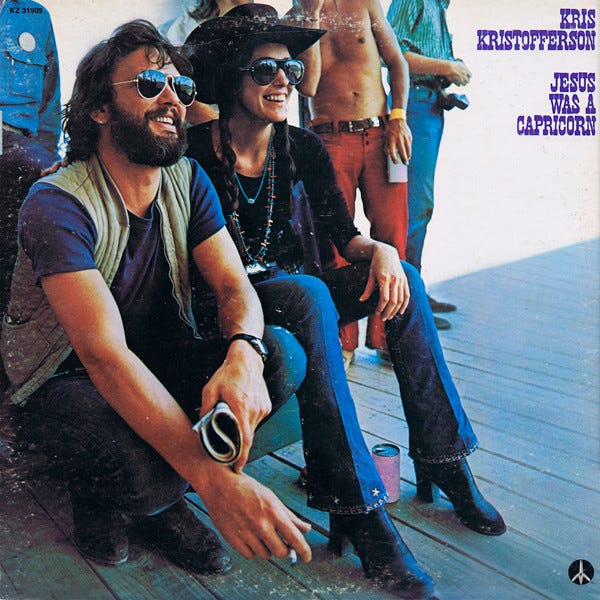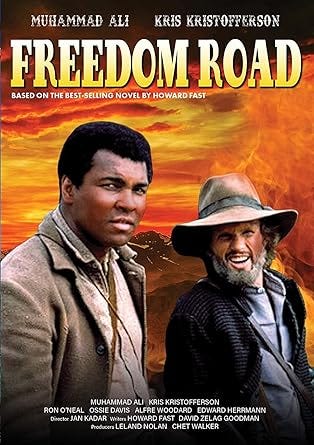HANDSOME MAN BLUES: WAVING ADIOS TO KRIS KRISTOFFERSON
Notes on an American icon (who I grew up observing).
Waking up to the news that Kris Kristofferson has died at the age of 88 wasn’t a surprise: the Texan born singer, songwriter and actor had been in declining health for several years. Not cancer or heart failure but, punishingly for such an articulate and intelligent man, a disease that wasted his mind (Alzheimers or something akin to it).
This noted, I’ll add how Kristofferson did enjoy a very good innings – a half century+ of creativity and adulation – and to die in your own bed surrounded by loving family members (in Maui) is a pretty decent way to leave earth.
I became aware of Kris at an early age as my dad took my brother and I to see Pat Garrett & Billy The Kid at The Civic, Auckland’s most venerable movie theatre, in 1973. By then I had seen his albums – I used to flip through the LPs at our local white goods store while my parents shopped and can recall staring at his Jesus Was A Capricorn (Kris looking suitably iconic on the cover) – and heard mention of him on Kiwi radio (likely as “songwriter” when they played Janis Joplin or Gladys Knight’s versions of his songs). Dad didn’t take us to the movie cos he was a Kris fan – I’m certain he, having zero interest in popular music, had never heard of him (or Bob Dylan, who drifts in and out of the film) – but he sure did love Westerns.
Here’s the PG&BTK trailer. Kris doesn’t look good in this - his lifestyle wearing hard on him - and it doesn’t make me want to rewatch it.
I can still remember both the cinema and the film and wondering why, in one scene, James Coburn (Pat Garrett) was in bed with so many women (Peckinpah, I now realise, was a rank misogynist so this was his masculine fantasy - along with shooting lots of people). Even then I realised Kristofferson was far too old (and tall) to resemble Billy (I was an autodidact brat). And the movie dragged as we waited for Pat to execute Billy. Still, Kris definitely made an impression. I was 9 and wanted to be a cowboy, hey!
A few years later I purchased Al Green’s Greatest Hits Vol 2 and there, at the start of Side 2, was For The Good Times, a Kristofferson ballad that Al turns into a slice of smouldering pillow talk. I saw a few more of his movies: Convoy, another Peckinpah film, which I went to without my dad, is dismal, Kris and Ali McGraw sit throughout in a huge truck beset by a dire script and lack of any hint of drama/narrative. What to do? Nothing but employ their beautiful faces to pout – if there were awards for Best Raised Eyebrows/Best Sunglasses they would have scooped ‘em.
I haven’t seen Kris and Babs Streisand in A Star Is Born – I should, seeing I’ve seen the Judy Garland and Lady Gaga versions – but I don’t think its considered a classic. Or even just OK. In 1979 Kris co-starred in a US TV mini-series Freedom Road with Muhammad Ali (seemingly the only serious acting job Ali ever undertook). I’ve not seen Freedom Road and its apparently a rather stolid watch but, considering KK & MA were both American icons, I’m sure it conveys a certain grandeur.
Then, at some point, late 80s or early 90s, I caught KK’s cinematic debut, Cisco Pike, on late night TV and, this time, I was impressed. Cisco Pike was shot in 1970 and features Kris as a singer-songwriter just freed from prison (due to drug charges) yet harassed by Gene Hackman’s corrupt detective to sell a shitload of marijuana he’s grabbed from a bust.
Cisco Pike was one of those counterculture dramas made in the wake of Easy Rider’s huge success and, like that film, its very downbeat, hip but cynical. At the time the studio behind it disliked Cisco Pike intensely (not releasing it until 1972, and then giving it little promo). To me, Cisco captured something few films about musicians do: the loose back and forth and camaraderie they share, the drugs and mess, the selfishness and insecurity, the gambler’s belief in music as a vocation you are willing to risk everything on. I loved Doug Sahm’s cameo as a speed-freak musician, thought Harry Dean Stanton and Karen Black both well cast, and Kris, surely drawing on experience, was good as a down-on-his-luck musician, here fearful he will be sent back inside by a corrupt cop.
Here’s Cisco Pike in its entirety on Youtube - enjoy!
I later purchased Cisco on DVD and lent it to a “friend” who never returned it. These days its apparently streaming on Amazon Prime. Having seen various Kris movies over the years – including Lone Star and a Blade – I think Cisco’s both his first and best. Some say he’s good in Heaven’s Gate but I’ve never seen that derailed epic.
When, decades later, I rewatched Pat Garrett & Billy The Kid on DVD I saw a very flawed film, sadistic and often incoherent. Striking cinematography, but little else to recommend this celebration of bad boys of the old West. Kris is flabby throughout - both of belly and performance. I imagine his tendancy to sport a beard from then on after is due to he having seen how gone-to-seed he looks here.
Indeed, Kris was one of the lucky minority born not only with gorgeous genes - tall, chiselled, piercing blue eyes - but capable of ageing well with his salt-and-pepper beard/hair. Thinking about it, he must qualify as one of the handsomest entertainers of the post-WW2 era. What he wasn’t born with was a voice: Village Voice critic Robert Christgau wrote of his 1970 album Kristofferson (which I own but never play) “he's the worst singer I've ever heard. It's not that he's off key - he has no relation to key. He also has no phrasing, no dynamics, no energy, no authority, no dramatic ability, and no control of the top two-thirds of his six-note range.” Yes, that effectively describes his skills as a singer.
Here’s Gladys singing KK’s tender anthem for physical affection. What a magnificent vocal performance!
Which is why his songs generally sound so much better when sung by artists who are gifted singers. Still, he looked good on his LP covers, and this certainly helped him sell a lot of records across the early 1970s. And I enjoyed the first Highwaymen album: here he lets Willie, Waylon and Johnny do the heavy lifting vocally while adding spine to the band: Kris always spoke out for the marginalised and oppressed (I’m willing to bet that their version of Woody Guthrie’s Deportee (Plane Wreck at Los Gatos) was at Kristofferson’s insistence).
His early life – gifted athlete, Rhodes scholar at Oxford, captain in the US airforce, offered a position to lecture at West Point, dropping out to work as a janitor at a Nashville recording studio while he worked on developing as a songwriter (one whose poetic, intimate lyricism would prove very influential at the start of the 1970s) – is mythic, the stuff that if it appeared in a novel you would say “too far fetched! Nobody could be this handsome and talented and famous and politically right-on and likeable!”
The legend is KK flew his military helicopter to Johnny Cash’s house, landed it with a beer in his hand, then presented this song to the understandably startled Cash. I don’t know how true this is but JC certainly sung KK’s song of hangovers and loneliness like no one else.
Early-to-mid 1970s country music featured many maverick talents: Guy Clark, Steve Young, Gram Parsons, TVZ, Billy Joe Shaver, Jimmie Dale Gilmore, John Anderson and Gary Stewart (to name a handful) all were remarkably original songwriters while far better singers than KK. Yet his fans on social media appear oblivious to the aforementioned: Kris was a hunky movie star and perfect liberal icon. I was chastised on FB for noting that he couldn’t sing: “paying homage” I was told is what we were supposed to do. Well, I paid to see his movies and hear his songs, so now my homage is to acknowledge that he was a decent man, but one whose beauty ensured he won far wide fame than many of his contemporaries. I’m guessing he would wryly admit such.
Incidentally, after his mega-fame faded he became a more interesting artist. Certainly, his post-superstardom life demonstrated how grounded he was: Kris kept writing songs and issuing albums on small labels and campaigning against US imperialism. My friend, the writer and musician, Elijah Wald shared this KK story: When I asked him how people on the country music scene were reacting to his songs about the horrors the US was supporting in Central America: "I remember a woman come up to me and really complaining: 'You just lost me when you start saying, "We're killing babies in the name of freedom."'' "I said, 'Well, what pisses you off? Me singing about it or us doing it?'"
This is an early KK song that Elijah loves and performs – its a wry, Roger Miller-style narrative and, as its more spoke-sung, his vocal limitations aren’t a detriment
Once the No Depression alt.country crowd began championing Kris some twenty years or so ago I did cock an ear, on occasion, to his new albums. These proved that he hadn’t improve much as a singer – he had no voice to really work with – but his wit, inherent decency, willingness to speak out on matters that the entertainment industry (especially country music) would rather remained ignored (+ his gift as a storyteller) ensured his concerts were surely worth attending. I never went to one. My bad. Thanks for the good times, Kris.
Finally: here’s a link for an epic Rolling Stone profile by Ethan Hawke (yes, the actor) of KK from 2009. Its a good read: https://www.rollingstone.com/music/music-features/kris-kristofferson-last-outlaw-poet-ethan-hawke-interview-714098/?fbclid=IwY2xjawFp9pleHRuA2FlbQIxMQABHcjbAMMty2XwZnM3UjlTuwN1X7VFF9iph5huZay4TfMTlhGRPmFZK-5irg_aem_MHpbFHeY6ruicDhuJHAKgg
Two remarkable Americans came together in what’s apparently a pretty average mini-series. I wonder if Kris and Muhammad found they had much in common on set? Considering KK’s music and liking for cigarettes/drugs/alcohol I doubt it, but I could be wrong.





